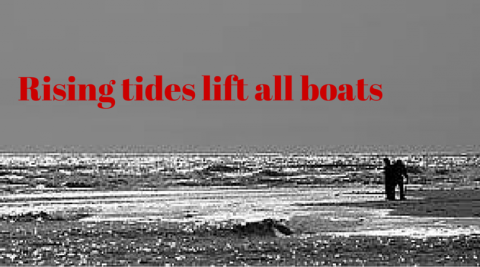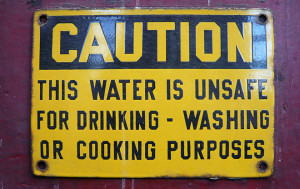December 29, 2015
BURLINGTON, ON
Columnist Ray Rivers looks at 2015 and comments on where we got it right and where we could have done better. Before taking a month off to travel, refresh and get caught up on his reading Rivers will suggest where 2016 might take us.
Justin Trudeau’s decisive victory at the polls has ushered in a new sense of hope and promise. He is just one person but he has ignited a sense of optimism in the land, and the refugee resettlement issue has been an effective policy instrument. A promise is a promise, but does it really matter whether it’s 10,000 people by the end of the year, unless you happen to be one of those refugees, that is.
Having decided to open our doors to those in need has changed the nature of the debate. No longer just an international obligation, immigration is now cast as an investment in our future. Fear of terrorists among the masses has been replaced with a reflection on the benefits previous refugee settling programs have brought us, going back to the early Irish migrations.
Barely two months into office this new leadership has already shaken up our public service. Scientists are once again allowed to speak openly about their findings, and the long-form census is back, fulfilling vital information needs. The promised middle-income tax cut has already been effected, and a non-partisan process for appointing senators is being developed.
But sooner than later Mr. Trudeau will need to beef up the foot soldiers who carry out his wishes. He’ll need a fully responsive, enthusiastic and capable bureaucracy to implement the government’s political will. Over the previous decade the federal public service had atrophied and in some areas, like environmental management, been decimated. Disillusioned and depreciated, many of the smartest people chose to leave rather than suffer the indignation of serving a government which resented them as burdensome, redundant and a drain on the public purse.
Canada is a federation and it works best when the central and provincial governments are working together, something we’ve seen in spades even in the brief time that the Liberals have been in office, and something that had been missing over the last decade. It may help that most of the provinces are also Liberal, or Liberal friendly, except for Saskatchewan. But a common political stripe doesn’t guarantee harmony, as we saw with the earlier PC government in Newfoundland.
There is a new sense of mutual respect for the positions of others. For example, even though the PM has enough support to revise the Canada Pension Plan, he’s waiting for B.C. and Saskatchewan to climb on board. Climate change is a priority, but since the provinces will be doing much of the heavy lifting they will be a big part of the process, thereby ensuring greenhouse gas reduction plans and targets are truly national – for the first time.
 It is said that a rising tide lifts us all. Well at least Trudeau’s election victory did for the popularity of the newly elected premiers in the Atlantic provinces. But it didn’t do much for the Liberal leaders in Ontario and Quebec. Voter fatigue is a natural phenomena for a government in power as long as the Liberals have been in Ontario. And the polls also reflect the public’s impatience with what it sees as less than satisfactory performance.
It is said that a rising tide lifts us all. Well at least Trudeau’s election victory did for the popularity of the newly elected premiers in the Atlantic provinces. But it didn’t do much for the Liberal leaders in Ontario and Quebec. Voter fatigue is a natural phenomena for a government in power as long as the Liberals have been in Ontario. And the polls also reflect the public’s impatience with what it sees as less than satisfactory performance.
The debt and deficits are a problem. But it’s all the other screw-ups which leave one with the sense of lack of competence. And each screw-up makes it harder for a government to recover lost confidence and credibility. Recently the provincial auditor general (AG) claimed that $37 billion was wasted on the electricity file over the last decade. If accurate, that is a powerful lot of money wasted on that file. Is it any wonder most Ontario householders didn’t trust the government to effect the sell-off of Hydro One?
Poor political direction or failed administrative execution? It’s pretty clear that the gas plant fiasco, including the alleged attempted cover-up was almost entirely political. But that only accounts for one-thirty-seventh of the AG’s allegations. If the role of the civil service is to keep the government that is in power, to stay in power, then they are doing a pretty inadequate job on that file. And part of the reason may be that the organization is stale-dated and long overdue for renewal.
 Ontario’s government hasn’t seen much re-organization over the years, certainly not compared to the federal government. One of the boldest attempts at renewal was prescribed in Mike Harris’s common sense revolution. And of course smaller government was always better, in his mind. Well it may have looked good on paper and it won him the election. But as former Harris education minister Snobelen found, creating crises as an approach to organizational re-engineering just leaves you with… chaos.
Ontario’s government hasn’t seen much re-organization over the years, certainly not compared to the federal government. One of the boldest attempts at renewal was prescribed in Mike Harris’s common sense revolution. And of course smaller government was always better, in his mind. Well it may have looked good on paper and it won him the election. But as former Harris education minister Snobelen found, creating crises as an approach to organizational re-engineering just leaves you with… chaos.
And whatever good was accomplished by Harris’ red-tape cutting gestapo was soon lost following the Walkerton scandal, in which seven people died after drinking improperly treated water That tragic incident probably had more to do with downsizing than red-tape, but the baby got thrown out with the polluted bathwater anyway. And the result, ironically, was even more rules and more civil servants to enforce them.
Like most Ontario residents I cheered to the news that beer would now be available in grocery stores. But then I learned of all the rules surrounding what should be a simple transaction for a mildly alcoholic beverage – rules that didn’t seem to apply equally at many of the existing in-grocery wine stores, nor at the many rural LCBO franchise outlets. Was this a case of too many provincial lawyers with too much ink in their quills and too little else to write about – or just more of that nanny-state we’ve grown to love?
One of the provincial Liberals’ campaign promises was to enhance our pensions through a provincial plan. Reducing the inequality between those with an institutional or private pension plan and those without is a liberal ideal. But with E-health and ORNGE in mind it is understandable that there is some lack of confidence in this government’s ability to effectively deliver that program. So, it is no surprise that Ontario residents would prefer the new federal government to do it for us as part of our Canada Pension Plan.
 Ray Rivers writes weekly on both federal and provincial politics, applying his more than 25 years as a federal bureaucrat to his thinking. Rivers was a candidate for provincial office in Burlington where he ran as a Liberal against Cam Jackson in 1995, the year Mike Harris and the Common Sense Revolution swept the province. Rivers is no longer active with any political party.
Ray Rivers writes weekly on both federal and provincial politics, applying his more than 25 years as a federal bureaucrat to his thinking. Rivers was a candidate for provincial office in Burlington where he ran as a Liberal against Cam Jackson in 1995, the year Mike Harris and the Common Sense Revolution swept the province. Rivers is no longer active with any political party.
Background links:
Rebooting the Public Service Premier’s Positive Outlook A Rising Tide























I have to agree with most of your views Ray. The decade of darkness that was the Harper government not only damaged the professional civil service but also the mood of the country. We are once again a country filled with hope and joy rather than fear and loathing of those who are on our “enemies list.”
Provincially I too am suspect of the current government. I am a Liberal but would have voted against them in the last provincial election if there had been a viable alternative.
Thanks for the update ‘Nobody Worth Mentioning – lies, damned lies and statistics
https://authors.library.caltech.edu/25038/186/Chapter%2012.%20Statistics%20and%20other%20damned%20lies.pdf
Happy New Year one and all
Ray
It’s not an update or a lie Mr. Rivers. The data is from the same set of RBC tables which you quoted to B. Wayne.
Can we agree that we have a Federal debt to GDP ratio of 31% (RBC tables), an Ontario debt to GDP ratio of 39.4% (RBC tables) and a “Canada” debt to GDP ratio of 86.5% (as per your source)?
Clarification of the difference between “Federal” debt to GDP and “Canada” debt to GDP would be useful information. I for one, would be interested to know what constitutes “Canada’s” debt to GDP ratio. Is it an aggregate of Federal and Provincial? If so, It would go a long way to explain why “Canada’s” debt to GDP ratio is double that of Ontario’s.
Dear Nobody – As I said before, thank you for your comment. We do agree on the size of the debt. The numbers are the numbers. It was good of you to provide the additional information to my previous comment as it helps the discussion.
Thanks
Ray
On what basis do you say: ushered in hope, promise and optimism. Sounds more like your opinion mixed with some wishful thinking from a dye hard and perhaps somewhat myopic liberal. Sturdy words you use for a drama teacher whose only claim to fame is his last name. With a different last name do you think he would be where he is today?? That is not to say that there was not a need for change. We are stuck with him for 4 years so time will tell: political dogma is one thing; performance counts.
Please note: it must never be the role of the civil service to keep the government that is in power, to stay in power. Their job is to administer the legislation to the point of reasonable enforcement. The nebulous machinations of politicians and senior bureaucrats only rarely have practical applications. It is the customer-level, impartial, usually under-paid civil servant who is truly the hero in any effective legislation.
Dear B. Wayne – Thanks again for listing the source of your information. I note that Joe Oliver provided no links in his article. I don’t subscribe to the National Post, in part because they allow articles like this one to be published without proper vetting or supporting information. Oliver’s outrageous assertion is not the only error he made in that article (he has the bond rating wrong as well).
“If Ontario residents want to look on the bright side, they can take solace that the province certainly isn’t a fiscal basket case of Greek proportions. But at the same time, it’s a bad sign that Standard & Poor’s lowered Ontario’s financial rating to A+ from AA-, citing the provincial government’s heavy debt burden and budgetary “underperformance” compared with peers in other jurisdictions. The lower the province’s financial rating, the more expensive it becomes for the government — and taxpayers — to borrow money to pay for its operations.
S&P said Monday that while Ontario continues to beat its fiscal targets and expects to close its operating budget gap by fiscal 2018, it will still have to contend with sizeable yearly after-capital deficits given its large net capital spending plans. The rating agency said the downgrade comes with a stable outlook, reflecting its belief that Ontario will continue to make slow progress in reducing its deficit.”
https://www.torontosun.com/2015/07/06/agency-downgrades-ontarios-credit-rating
https://www.theglobeandmail.com/report-on-business/economy/national-debt/article24397940/
https://www.tradingeconomics.com/canada/government-debt-to-gdp
Canada’s Debt to GDP ratio at 86.5 is twice that of Ontario… and Oliver was our finance minister. We should all be glad that Oliver no longer is our finance minister He clearly doesn’t understand something as simple as debt.
Ray
Federal Debt to gdp ratio…………31% (minus 6 points over 10 years)
Ontario Debt to gdp ratio…………39.4% (plus 13 points over 10 years)
Federal per Capita debt…………..$17,200 (up from $15,500 10 years ago)
Ontario debt per Capita…………..$21,000 (up from $11,400 10 years ago)
See page 12 and 13. Hope this can further assist in simplifying a couple of important federal and provincial debt ratio’s.
https://www.rbc.com/economics/economic-reports/pdf/provincial-forecasts/prov_fiscal.pdf
Dear B. Wayne – Thanks again for listing the source of your information. I note that Joe Oliver provided no links in his article. I don’t subscribe to the National Post, in part because they allow articles like this one to be published without proper vetting or supporting information. Oliver’s outrageous assertion is not the only error he made in that article (he has the bond rating wrong as well).
“If Ontario residents want to look on the bright side, they can take solace that the province certainly isn’t a fiscal basket case of Greek proportions. But at the same time, it’s a bad sign that Standard & Poor’s lowered Ontario’s financial rating to A+ from AA-, citing the provincial government’s heavy debt burden and budgetary “underperformance” compared with peers in other jurisdictions. The lower the province’s financial rating, the more expensive it becomes for the government — and taxpayers — to borrow money to pay for its operations.
S&P said Monday that while Ontario continues to beat its fiscal targets and expects to close its operating budget gap by fiscal 2018, it will still have to contend with sizeable yearly after-capital deficits given its large net capital spending plans. The rating agency said the downgrade comes with a stable outlook, reflecting its belief that Ontario will continue to make slow progress in reducing its deficit.”
https://www.torontosun.com/2015/07/06/agency-downgrades-ontarios-credit-rating
https://www.theglobeandmail.com/report-on-business/economy/national-debt/article24397940/
https://www.tradingeconomics.com/canada/government-debt-to-gdp
Canada’s Debt to GDP ratio at 86.5 is twice that of Ontario… and Oliver was our finance minister since he was tossed out in the last election. We should all be glad that Oliver no longer is our finance minister He clearly doesn’t understand something as simple as debt.
Ray
Ray, please see article below:
https://business.financialpost.com/fp-comment/joe-oliver-ontarios-fiscal-train-wreck
Dear B. Wayne – Thank you for comment but I’m not sure why being a sub national has any significance in the discussion of debt. In any case, debt per capita is greatest in Quebec, among provinces.
Ontario’s debt was 37.4% of its GDP in 2013. The comparable number for Greece was 173% and for Japan 140%. Please note the table below with provincial debt per capita. The US has a debt to GDP ratio of 87%, almost double Ontario’s and the largest total debt of any nation on earth – twice that of Japan. https://www.forbes.com/sites/danalexander/2013/11/08/worlds-largest-debtor-governments-2013/2/
The amount of provincial net debt per resident in 2014-15 (Source: RBC Economics Research – Federal and Provincial Fiscal Tables)
B.C: $8,590
Alberta: minus $2,093
Saskatchewan: $4,536
Manitoba: $14,645
Ontario: $20,779
Quebec: $23,177
New Brunswick: $16,642
Nova Scotia: $15,870
PEI: $14,819
Newfoundland and Labrador: $19,469
Federal government: $17,332
Please don’t forget that Ontario has the dubious distinction of being the largest sub national debtor in the entire world. Way to go Ontario Liberals!